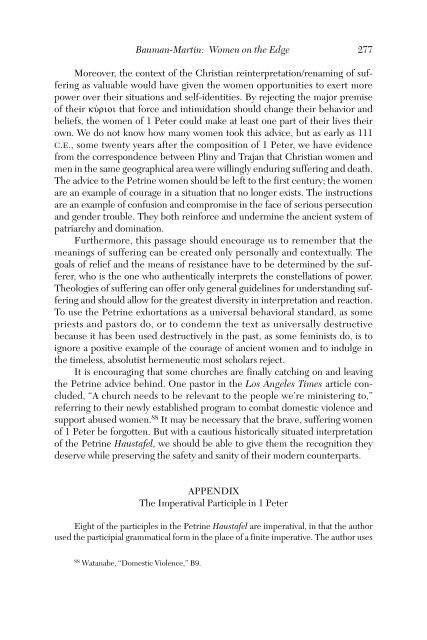Journal of Biblical Literature - Society of Biblical Literature
Journal of Biblical Literature - Society of Biblical Literature
Journal of Biblical Literature - Society of Biblical Literature
Create successful ePaper yourself
Turn your PDF publications into a flip-book with our unique Google optimized e-Paper software.
Bauman-Martin: Women on the Edge 277<br />
Moreover, the context <strong>of</strong> the Christian reinterpretation/renaming <strong>of</strong> suffering<br />
as valuable would have given the women opportunities to exert more<br />
power over their situations and self-identities. By rejecting the major premise<br />
<strong>of</strong> their kuvrioi that force and intimidation should change their behavior and<br />
beliefs, the women <strong>of</strong> 1 Peter could make at least one part <strong>of</strong> their lives their<br />
own. We do not know how many women took this advice, but as early as 111<br />
C.E., some twenty years after the composition <strong>of</strong> 1 Peter, we have evidence<br />
from the correspondence between Pliny and Trajan that Christian women and<br />
men in the same geographical area were willingly enduring suffering and death.<br />
The advice to the Petrine women should be left to the first century; the women<br />
are an example <strong>of</strong> courage in a situation that no longer exists. The instructions<br />
are an example <strong>of</strong> confusion and compromise in the face <strong>of</strong> serious persecution<br />
and gender trouble. They both reinforce and undermine the ancient system <strong>of</strong><br />
patriarchy and domination.<br />
Furthermore, this passage should encourage us to remember that the<br />
meanings <strong>of</strong> suffering can be created only personally and contextually. The<br />
goals <strong>of</strong> relief and the means <strong>of</strong> resistance have to be determined by the sufferer,<br />
who is the one who authentically interprets the constellations <strong>of</strong> power.<br />
Theologies <strong>of</strong> suffering can <strong>of</strong>fer only general guidelines for understanding suffering<br />
and should allow for the greatest diversity in interpretation and reaction.<br />
To use the Petrine exhortations as a universal behavioral standard, as some<br />
priests and pastors do, or to condemn the text as universally destructive<br />
because it has been used destructively in the past, as some feminists do, is to<br />
ignore a positive example <strong>of</strong> the courage <strong>of</strong> ancient women and to indulge in<br />
the timeless, absolutist hermeneutic most scholars reject.<br />
It is encouraging that some churches are finally catching on and leaving<br />
the Petrine advice behind. One pastor in the Los Angeles Times article concluded,<br />
“A church needs to be relevant to the people we’re ministering to,”<br />
referring to their newly established program to combat domestic violence and<br />
support abused women. 88 It may be necessary that the brave, suffering women<br />
<strong>of</strong> 1 Peter be forgotten. But with a cautious historically situated interpretation<br />
<strong>of</strong> the Petrine Haustafel, we should be able to give them the recognition they<br />
deserve while preserving the safety and sanity <strong>of</strong> their modern counterparts.<br />
APPENDIX<br />
The Imperatival Participle in 1 Peter<br />
Eight <strong>of</strong> the participles in the Petrine Haustafel are imperatival, in that the author<br />
used the participial grammatical form in the place <strong>of</strong> a finite imperative. The author uses<br />
88 Watanabe, “Domestic Violence,” B9.

















